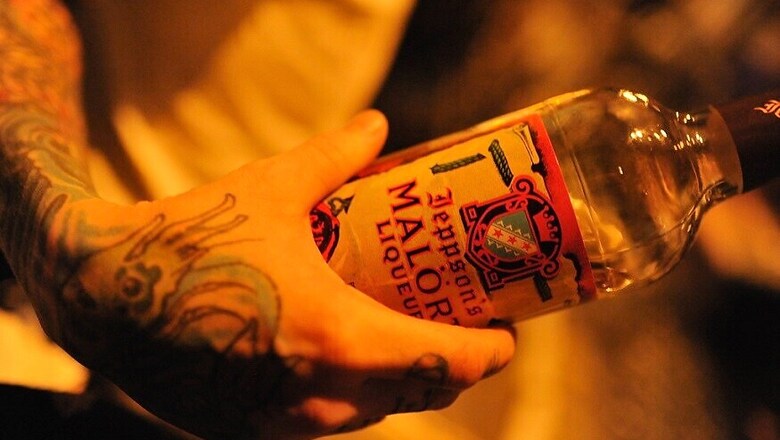
views
 "Most first-time drinkers of (it) reject our liquor. Its strong sharp taste is not for everyone. Our liquor is rugged and unrelenting (even brutal) to the palate. We found only 1 out of 49 men will drink (it) after the first ‘shock-glass.’”
"Most first-time drinkers of (it) reject our liquor. Its strong sharp taste is not for everyone. Our liquor is rugged and unrelenting (even brutal) to the palate. We found only 1 out of 49 men will drink (it) after the first ‘shock-glass.’”
Where else can you find a spirit most honest than Jeppson’s Malört, a Swedish drink found in America in the 1930s, which claims on its label that you probably won't like it? Look, there is more to read: "Our liquor is rugged and unrelenting (even brutal) to the palate…we found only 1 out of 49 men will drink Jeppson’s Malört after the first ‘shock-glass'."
If the makers themselves are that unkind you can imagine what the customers would do to its reputation.
"Malort, when you need to unfriend someone IN PERSON," one claims on twitter, just after tasting it. People fight over the nuances of its taste, one group claiming that it has more affinity to vomit while another says, it closes in on gasoline. A Reddit user is more specific: “Imagine twisting damp socks after a heavy workout and squeezing the moisture into a bottle. Fill the bottle with that, let it ferment in a warm closet. That’s Malort.”
Malort is 'wormwood' in Swedish. Jeppeson's edition shares the weed with the more popular absinthe, but doesn't bother to cut its tartness with sugar cubes in any ritual that might mellow it. If you want to qualify you must take it raw. Straight.
Even during those hoary times, Swedes were guzzling down their traditional liquor brännvin, a clear, 70-80 proof unflavored beverage made from potatoes or grain, against their beautiful Nordic landscapes. Later along with Nordic migration, the drink somehow managed to sneak into the US.
It was Carl Jeppson, Swedish immigrant, who introduced the modern form of brannvin into Chicago. It was the 30s and prohibition was in full swing. But he knew how to circumvent the prohibition. He sold his new drink - Jeppeson's Marlot - as a cure for menstrual cramps (Medicines were kosher during the time and could also afford to be bitter).
It is said that the bitter taste of Malort had a lot to do with Carl's smoking habit which had numbed his tastebuds. He made the drink strong enough for his tongue could pick something from i.
Before he died in 1949, Carl sold his drink along with the recipe to George Brode, a liquor magnate based in Chicago. The new proprietor of the drink that everyone just loved to hate, ingeniously attached a question to the label on the bottle:
"Are you man enough?"
Well, that hit a raw nerve. People began to see the ritual of drinking Jeppeson as a rite of passage, as a means to prove that they're are man enough to stand this new challenge from Scandinavia. Young people began to throng the joints in Chicago inviting their friends who brag a lot. Try this and prove it, they demanded.
A man in Chicago maintains a collection of photos of the contorted expressions of people who have taken Jeppeson shots for the first time in their lives. When a burglary in a shop resulted in the loss of seven cases of the liquor, the bar owner could only laugh imagining the disappointment of the thieves going through the drink.
Still, the popularity of the odd drink has only risen over the years.
Before George Brode breathed his last in 1999 he could bequeath the legacy of Jeppson’s Malört to his secretary Patricia Gabelick. She stuck to the original retro style campaigns, harping on the same old, perhaps-now-politically-incorrect appeal to macho sentiments. She successfully fought bitter legal wars with a few distillers who tried to make similar liquors.
Today some bartenders in Chicago keep a bottle of Malort handy for those customers who come for freebies. They'd never return, they claim.
(Manu Remakant is a freelance writer who also runs a video blog - A Cup of Kavitha - introducing world poetry to Malayalees. Views expressed here are personal)




















Comments
0 comment